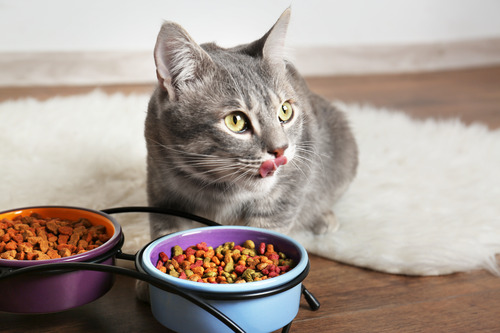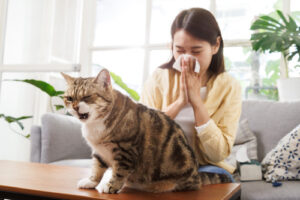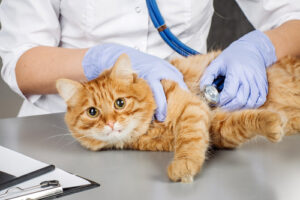Ensuring your feline friend gets the right nutrition can enhance their quality of life, help maintain a healthy weight, and prevent health issues. This guide will explore what makes the best cat food for indoor cats, considering factors such as ingredients, nutritional balance, and your cat’s specific needs. For advice tailored to your pet’s unique needs, call our Vaughn Road location at (334) 271-1003, call our Carter Hill location at (334) 269-2508, or request an appointment online.
An Indoor Cats’ Nutritional Needs
Indoor cats lead a different lifestyle compared to their outdoor counterparts. They have less physical activity and face different environmental challenges. Therefore, their nutritional needs differ significantly.
Lower Calorie Requirements
Indoor cats are typically less active, meaning they burn fewer calories. Feeding them a diet high in calories can lead to obesity, which brings its own set of health problems, such as diabetes and joint issues. Choosing the best cat food for indoor cats means selecting options with lower calorie content.
Hairball Control
Since indoor cats groom themselves frequently, they are more prone to hairballs. Look for cat foods that include fiber to help control and reduce hairballs. Many brands specifically formulate their indoor cat food to address this common issue.
Balanced Nutrients
A balanced diet is crucial for any cat. Ensure that the cat food you choose contains the right mix of proteins, fats, vitamins, and minerals. Proteins should come from high-quality sources such as chicken, fish, or turkey. Fats provide essential fatty acids that support skin and coat health.
Ingredients to Look for in the Best Cat Food for Indoor Cats
Selecting the best cat food for indoor cats involves scrutinizing the ingredient list. Quality ingredients can make a significant difference in your cat’s health and well-being.
High-Quality Protein
Protein is the most crucial part of a cat’s diet. Look for foods where the first ingredient is a high-quality source of protein. Chicken, turkey, salmon, and other named meats are preferable to meat by-products or meals.
Healthy Fats
Fats are essential for energy and to support skin and coat health. Ensure the food contains healthy fats like omega-3 and omega-6 fatty acids, which can be found in ingredients such as fish oil or flaxseed.
Fiber for Digestion
Fiber is vital for maintaining healthy digestion and reducing hairballs. Ingredients like beet pulp, pumpkin, or psyllium seed husk are excellent sources of fiber.
Limited Carbohydrates
Cats are obligate carnivores, meaning their diet should be primarily protein-based. Carbohydrates should be limited, and grains such as corn and wheat should be avoided when possible. Instead, look for foods with vegetables and legumes as carbohydrate sources.
How to Transition to a New Cat Food
Switching your cat to a new food should be done gradually to avoid digestive issues. Here’s how to make the transition smooth and stress-free.
- Gradual Introduction: Start by mixing a small amount of the new food with your cat’s current food. Gradually increase the amount of the new food while decreasing the old over a period of 7-10 days.
- Monitor Your Cat’s Reaction: Watch for any signs of digestive upset, such as vomiting or diarrhea. If your cat shows any adverse reactions, slow down the transition process.
- Maintain Consistency: Ensure that the feeding schedule remains consistent. Cats thrive on routine, and consistent meal times can help with the transition to new food.
Common Questions About Indoor Cat Nutrition
Cat owners often have questions when it comes to feeding their indoor cats. Here are some common inquiries and their answers.
How Often Should I Feed My Indoor Cat?
Most indoor cats do well with two meals per day. However, some cats prefer smaller, more frequent meals. Consult with your veterinarian at Montgomery Veterinary Associates to determine the best feeding schedule for your cat.
Can Indoor Cats Eat Wet Food?
Yes, wet food can be a great addition to your indoor cat’s diet. It provides additional hydration and can be more palatable for picky eaters. Just ensure it complements their dry food diet and meets their nutritional needs.
What Should I Avoid in Cat Food?
Avoid cat foods with artificial colors, flavors, and preservatives. These additives provide no nutritional value and can be harmful in the long run. Additionally, steer clear of foods with excessive fillers like corn, soy, and wheat.
Tailoring Your Cat’s Diet for Optimal Health
Every cat is unique, and their dietary needs can vary. Consider your cat’s age, health status, and activity level when choosing the best cat food for indoor cats. Routine wellness exams are essential to monitor their health and adjust their diet as needed.
- Age-Specific Needs: Kittens, adults, and senior cats all have different nutritional requirements. Ensure that the food you choose matches your cat’s life stage.
- Health Conditions: If your cat has specific health issues, such as kidney disease or allergies, consult your veterinarian. They may recommend a prescription diet or specific ingredients to avoid.
- Activity Level: Even among indoor cats, activity levels can vary. More playful or active cats may need a slightly higher calorie intake compared to more sedentary cats.
Consult Your Veterinarian for Personalized Advice
Choosing the best cat food for indoor cats is an important decision that can significantly impact your pet’s health and happiness. While this guide provides general recommendations, it’s crucial to consult your veterinarian for personalized advice. The team at Montgomery Veterinary Associates can help you select a diet tailored to your cat’s specific needs and monitor their health over time. For more information or to schedule a consultation, call our Vaughn Road location at (334) 271-1003, call our Carter Hill location at (334) 269-2508, or request an appointment online.






